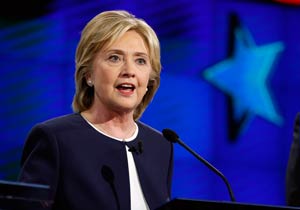
Two Iranian-American organizations have sharply criticized Hillary Clinton for citing “Iranians” as enemies during the first Democratic presidential debate last week.
Moderator Anderson Cooper noted that President Franklin Roosevelt once commented that he should be judged by the enemies he had made, and then asked the five candidates, “Which enemy are you most proud of?”
Former Sen. Lincoln Chafee cited the coal lobby and former Maryland Gov. Martin O’Malley named the National Rifle Association (NRA). Then Cooper called on Clinton and she said:
“Well, in addition to the NRA, the health insurance companies, the drug companies, the Iranians.” The audience then broke into laughter. “Probably the Republicans,” Clinton added, and the audience broke into laughter and applause.
While the context of the question was clearly about political enemies and not military enemies, both the Public Affairs Alliance of Iranian Americans (PAAIA) and the National Iranian American Council (NIAC) objected, with PAAIA calling the comment “incendiary” and NIAC labeling it “hostile.”
PAAIA said, “Hillary Clinton made what many view as highly offensive and incendiary comments by equating Iranians as her enemy…. While her intentions may have been different, many ordinary Iranians have taken offence.”
Dr. Leila Austin, executive director PAAIA, said, “As the former secretary of state and one who is seeking the highest office in the nation, Secretary Clinton should make clear that her remarks do not reflect her attitude toward the Iranian people. Such insensitive and incendiary remarks have a potential to damage long-term US interests.”
PAAIA said, “Such comments are offensive to Americans of Iranian heritage, and have the potential to encourage stereotyping, ill will and hatred against a particular group of Americans. Whatever differences may exist with the government of Iran, presidential candidates must make a distinction between the government and the people of Iran.”
The NIAC was milder in its comments. NIAC Action Executive Director Jamal Abdi said: “Such rhetoric is an embrace of the dangerous past rather than a more promising future…. It took true leadership for President Obama to extend a hand in negotiations and break that vicious cycle. The process started, in part, with the president putting an end to the hostile rhetoric that only empowers hardliners in both countries.”